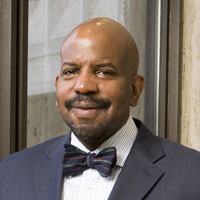Cato T. Laurencin, M.D., Ph.D.
University Professor, UConn;
Chief Executive Officer, Connecticut Institute for Clinical and Translational Science (CICATS);
Director, Institute for Regenerative Engineering;
Endowed Chair Professor, Department of Orthopaedic Surgery, UConn Health Center;
Tenured Professor, School of Engineering

Dr. Laurencin previously served as the UConn Health Center’s Vice President for Health Affairs and Dean of the UConn School of Medicine. Prior to that Dr. Laurencin was the Lillian T. Pratt Distinguished Professor and Chair of the Department of Orthopaedic Surgery at the University of Virginia, as well as the Orthopaedic Surgeon-in-Chief at the University of Virginia Health System. In addition, he was designated as a University Professor at the University of Virginia by the President and held professorships in biomedical engineering and chemical engineering.
Dr. Laurencin earned his undergraduate degree in chemical engineering from Princeton University and his medical degree, Magna Cum Laude, from the Harvard Medical School. During medical school, he also earned his Ph.D. in biochemical engineering/biotechnology from the Massachusetts Institute of Technology.
An expert in shoulder and knee surgery, Dr. Laurencin has been named to America’s Top Doctors and America’s Top Surgeons. He is a Fellow of the American College of Surgeons, a Fellow of the American Academy of Orthopaedic Surgeons, and is one of a few orthopaedic surgeons elected to the American Surgical Association. He is the winner of the Nicolas Andry Award from the Association of Bone and Joint Surgeons.
Dr. Laurencin’s research involves tissue engineering, biomaterials science, nanotechnology and stem cell science, and a new field he terms ‘regenerative engineering’. He is an International Fellow in Biomaterials Science and Engineering, a Fellow of the American Institute for Medical and Biological Engineering, and a Fellow of the Biomedical Engineering Society. His work was honored by Scientific American Magazine as one of the 50 greatest achievements in science in 2007. Dr. Laurencin was named the 2009 winner of the Pierre Galletti Award by the American Institute for Medical and Biological Engineering at its centennial celebration. Dr. Laurencin is active in technology development. In 2012 his work in musculoskeletal tissue regeneration was featured in National Geographic Magazine’s “100 Discoveries that Changed Our World” edition. In addition, he received the Technology, Innovation and Development Award from the Society for Biomaterials in 2013 for key scientific and technical innovation and leadership in translational research.
Dr. Laurencin’s work in mentoring students is well known. He received the Presidential Award for Excellence in Science, Mathematics and Engineering Mentoring in ceremonies at the White House in 2010 and the Beckman Award for Mentoring in 2012. Most recently Dr. Laurencin was honored by the American Association for Advancement of Science, receiving the AAAS Mentor Award.
Dr. Laurencin has lectured throughout the world on clinical orthopaedic surgery and musculoskeletal research. He is an elected member of the Third World Academy of Sciences, and an elected member of the African Academy of Sciences.
Dr. Laurencin is active in science and health policy. He has been a member of the National Science Foundation’s Advisory Committee for Engineering (ADCOM), and has served both on the National Science Board of the FDA and the National Advisory Council for Arthritis, Musculoskeletal and Skin Diseases at the NIH. Dr. Laurencin is currently a member of the National Academies Board of Life Sciences, and the National Academies Division Committee on Engineering and Physical Sciences (DEPSCOM). He currently holds appointments by the Secretary of Health and Human Services to the National Advisory Council for Biomedical Imaging and Bioengineering, and the Advisory Committee to the Director of the National Institutes of Health.
Return to The John and Valerie Rowe Scholars Visiting Lecture